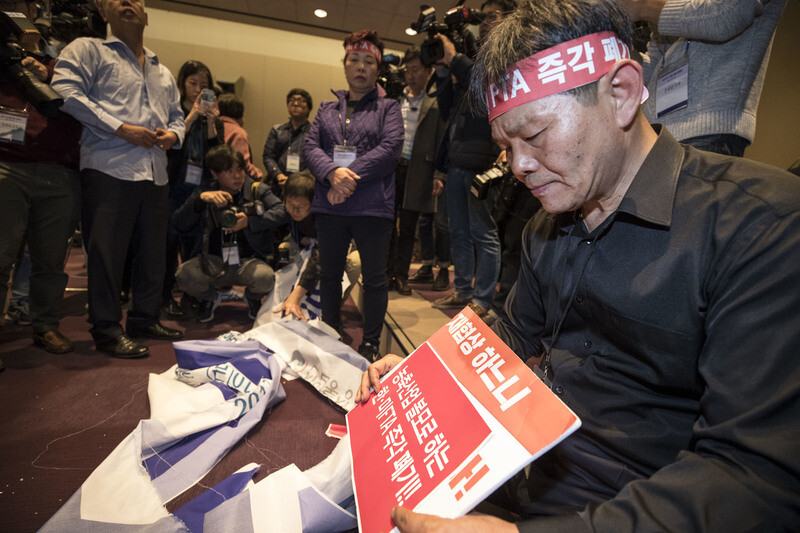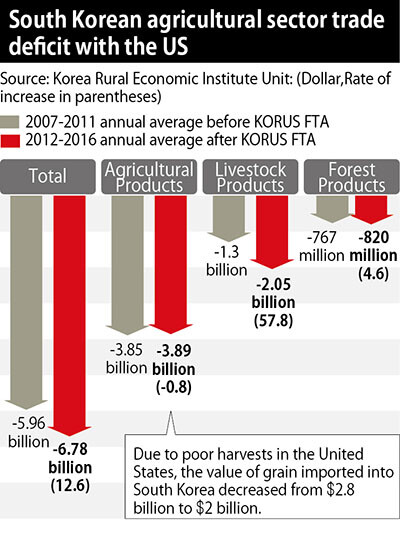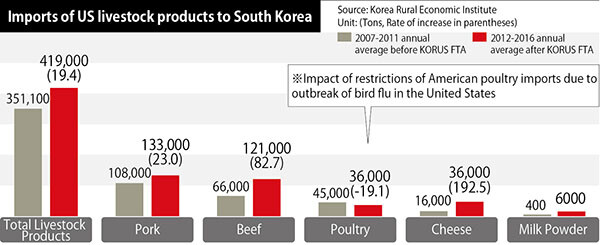hankyoreh
Links to other country sites 다른 나라 사이트 링크
South Korea’s trade deficit with US in agro-livestock products continues to grow

With imports of American agro-livestock products increasing every year since the South Korea-US Free Trade Agreement (KORUS FTA) took effect in Mar. 2012, South Korea’s trade deficit with the US in agro-livestock products continues to grow as well.
South Korea’s trade deficit with the US in agro-livestock products during the five years since the KORUS FTA took effect (2012–2016) is a yearly average of US$6.7 billion, which is up US$750 million relative to the deficit of US$5.95 billion won in the five years before the agreement took effect (2007–2011). Though South Korea’s exports of agro-livestock products to the US did increase during this period, from a yearly average of US$400 million to US$590 million, the value of American imports leaped US$940 million (14.8%), from US$6.36 billion to US$7.3 billion.

Since the agreement took effect, the rate of increase in US imports (in terms of volume) has been led by fruits and vegetables, such as grapes, cherries and oranges (82.6%); livestock, including beef and pigs (57.8%); and processed foods, including composite food preparations (52.5%). Imports of grains, on the other hand, have declined by 26%. The import value of corn and other grains, which accounts for nearly half of the total US import value, has effectively offset the soaring rate of increase of US imports, since the US’s export volume of grain has been brought down by poor harvests.
“US imports of the items on which tariffs have been abolished are increasing each year in terms of both volume and value. South Korean agricultural exports to the US of vegetable seeds and processed food such as cigarettes, beverages and sausages are increasing,” the Korea Rural Economic Institute reported.
US beef’s domination of the South Korean market appears to be picking up speed. Figures provided by the Korea Trade Statistics Promotion Institute (KTSPI) show that the import volume of US beef increased from 106,000 tons in 2012, the first year after the KORUS-FTA took effect, to 169,000 tons in 2016, and that 151,000 tons have been imported so far this year (as of October).

In September, US beef pushed aside Australian beef to gain the number one share (47.7%) in the imported beef market. The volume of imported US pork rose from 131,000 tons in 2012 to 149,000 tons last year, with 125,000 tons imported through October of this year. Imports of milk powder increased from 19,000 tons in 2012 to 61,000 tons last year.
A comparison of import volume last year with the year before the agreement took effect shows that cherries had increased by 191%, or 226% in terms of value (a 24% tariff was immediately abolished); grapes by 74.9%, or 115% in terms of value (a 24% tariff is being phased out over 17 years); and oranges by 36%, or 64% in terms of value (a 50% tariff is being rolled back over 7 years).
When the agreement was ratified in 2011, the government announced that it had “protected domestic farmers” by applying seasonal tariffs or setting long-term concession schedules of “at least 12 years” for repealing tariffs on a total of 200 “sensitive items,” including beef, pork, grapes, cheese, soybeans for the table, potatoes for the table and milk powder. But in fact, nearly all farm products have been made vulnerable to harm during the five years since the floodgates were opened on imports.
“Superficially, current tariffs were maintained and long-term tariff abolition schedules were implemented, but in reality, the non-tariff quotas are increasing each year. This is leading to a rapid increase in imports, which means that the 10–15 year long-term schedules for tariff rollback are doing almost nothing to protect farmers,” said Lim Jeong-bin, a professor of agricultural economics and sociology at Seoul National University.
By Cho Kye-wan, staff reporter
Please direct questions or comments to [english@hani.co.kr]

Editorial・opinion
![[Editorial] Penalties for airing allegations against Korea’s first lady endanger free press [Editorial] Penalties for airing allegations against Korea’s first lady endanger free press](https://flexible.img.hani.co.kr/flexible/normal/500/300/imgdb/original/2024/0502/1817146398095106.jpg) [Editorial] Penalties for airing allegations against Korea’s first lady endanger free press
[Editorial] Penalties for airing allegations against Korea’s first lady endanger free press![[Editorial] Yoon must halt procurement of SM-3 interceptor missiles [Editorial] Yoon must halt procurement of SM-3 interceptor missiles](https://flexible.img.hani.co.kr/flexible/normal/500/300/imgdb/child/2024/0501/17145495551605_1717145495195344.jpg) [Editorial] Yoon must halt procurement of SM-3 interceptor missiles
[Editorial] Yoon must halt procurement of SM-3 interceptor missiles- [Guest essay] Maybe Korea’s rapid population decline is an opportunity, not a crisis
- [Column] Can Yoon steer diplomacy with Russia, China back on track?
- [Column] Season 2 of special prosecutor probe may be coming to Korea soon
- [Column] Park Geun-hye déjà vu in Yoon Suk-yeol
- [Editorial] New weight of N. Korea’s nuclear threats makes dialogue all the more urgent
- [Guest essay] The real reason Korea’s new right wants to dub Rhee a founding father
- [Column] ‘Choson’: Is it time we start referring to N. Korea in its own terms?
- [Editorial] Japan’s rewriting of history with Korea has gone too far
Most viewed articles
- 1Months and months of overdue wages are pushing migrant workers in Korea into debt
- 2[Editorial] Penalties for airing allegations against Korea’s first lady endanger free press
- 3Bills for Itaewon crush inquiry, special counsel probe into Marine’s death pass National Assembly
- 4Trump asks why US would defend Korea, hints at hiking Seoul’s defense cost burden
- 560% of young Koreans see no need to have kids after marriage
- 6S. Korea discusses participation in defense development with AUKUS alliance
- 7[Reporter’s notebook] In Min’s world, she’s the artist — and NewJeans is her art
- 8Korean firms cut costs, work overtime amid global economic uncertainties
- 91 in 3 S. Korean security experts support nuclear armament, CSIS finds
- 10[Guest essay] Maybe Korea’s rapid population decline is an opportunity, not a crisis